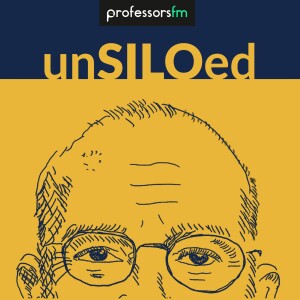
The Constitution of Knowledge feat. Jonathan Rauch
 2022-08-17
2022-08-17
Its hard to believe that a book like The Constitution of Knowledge: A Defense of Truth,” hasn't been written before, which surfaces the structures that we need in order to convert contention into facts and knowledge.
Jonathan Rauch is a senior fellow in the Governance Studies program at the Brookings Institute, and the author of eight books and many articles on public policy, culture, and government. He is a contributing writer for The Atlantic and recipient of the 2005 National Magazine Award, the magazine industry’s equivalent of the Pulitzer Prize.
His many Brookings publications include “The Constitution of Knowledge: A Defense of Truth,” as well as “The Happiness Curve: Why Life Gets Better after 50.” Although much of his writing has been on public policy, he has also written on topics as widely varied as adultery, agriculture, gay marriage, height discrimination, and animal rights.
Jonathan and Greg tackle a range of topics as well today, focusing on how journalism maintained a sense of professionalism purely based on voluntary norms, viewpoint diversity, American universities & cancel culture, and why people seek out difficult challenges.
Episode Quotes:Mainstream journalism vs. social media
The reason mainstream journalism is still so much more reliable and grown up than social media is editors, human beings who sit there and look at stuff and ask reporters and other people, have you checked this? What have you done to check it? Let me see your notes. And then they think about, so is this story ripe? What are the effects of publishing this story right now? Does it need to be more balanced? So, those are the trade-offs we make all the time. And I think one of the strong suits of mainstream media and why it's so important to keep it financially viable.
Learning happens in a place where you can take emotional risks
Learning happens when we are forced to encounter ideas that we find offensive, wrong-headed, bigoted, sometimes hateful, and difficult. And we need to encounter them in physically safe settings, where they are stated in non-threatening ways.
Fake news in the 19th Century:
In the 19th century, American journalism was as cesspool of hyper-partisanship and fake news, H.L. Mencken. The greatest American journalist of his era writes in his memoirs about how he and the other Baltimore reporters at the other newspapers would get together over drinks and fabricate stories for the next day's paper. And since they all reported the same thing, everyone assumed it was true. So how do we get out of that? Some people decide that enough is enough. They're starting to lose readers and credibility. The American Society of Newspaper Editors forms. First thing it does is formulate some rules and standards for journalists, things that seem obvious now, like, you know, check your facts, run corrections, be accurate, give people a chance to respond. Someone had to think of those. Meanwhile, we start to see the opening of journalism schools at universities in the early 20th century. And they start training people and inculcating those norms.
Recommended Resources:
- John Stewart Mill book: On Liberty
- University of Austin
Guest Profile:
- Faculty Profile at Brookings Institute
- Professional Profile at American Purpose
- Jonathan Rauch Website
- Jonathan Rauch on LinkedIn
- Jonathan Rauch on Twitter
His Work:
- Articles in The Atlantic
- Articles in National Affairs
- The Constitution of Knowledge: A Defense of Truth
- Kindly Inquisitors: The New Attacks on Free Thought
- Political Realism: How Hacks, Machines, Big Money, and Back-Room Deals Can Strengthen American Democracy
- Denial: My 25 Years Without a Soul
- The Happiness Curve: Why Life Gets Better After 50
- Gay Marriage: Why It Is Good for Gays, Good for Straights, and Good for America
More Episodes
Create your
podcast in
minutes
- Full-featured podcast site
- Unlimited storage and bandwidth
- Comprehensive podcast stats
- Distribute to Apple Podcasts, Spotify, and more
- Make money with your podcast
It is Free
- Privacy Policy
- Cookie Policy
- Terms of Use
- Consent Preferences
- Copyright © 2015-2024 Podbean.com






